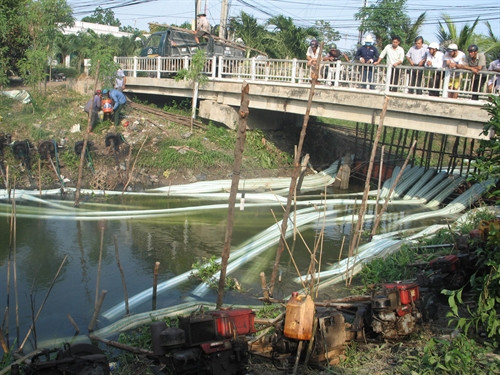 More than 20 pumps work to supply water in Tan Thanh Commune, Go Cong Dong District in the southern province of Tien Giang. (Source: VNA)
More than 20 pumps work to supply water in Tan Thanh Commune, Go Cong Dong District in the southern province of Tien Giang. (Source: VNA)HCM City (VNA) - Authorities in the Mekong Delta provinces have helped locals cope with the prolonged drought and salinity in rivers, minimising the losses caused by the twin disasters.
In Kien Giang province, they are using 20 pumps to move saltwater out of the Rach Gia–Long Xuyen and Ong Hien canals, trying to pump the salt water into the sea so that fresh water can flow from upstream into rivers and canals supplying Rach Gia City.
Nguyen Huu Hoai Phuong, director of the Kien Giang Water Supply and Drainage Co., said barges are used to carry freshwater, which is then pumped into a reservoir used by the company’s water supply system.
“With this water, Kien Giang’s water pumping station can operate at 65 percent of capacity,” Phuong said.
In addition, the company has dug three wells to draw more water for people’s daily needs.
In Ca Mau province, the chairman of the provincial People’s Committee, Nguyen Tien Hai, has instructed relevant agencies and authorities at district and commune levels to provide financial support to paddy farmers whose fields have been damaged.
The prolonged drought has damaged over 51,000ha of paddy fields, of which 33,000ha have been damaged by over 70 percent.
It has affected the livelihoods of 36,000 rice farmers.
Families who suffered 30-70 percent damage are receiving relief of 1 million VND (44 USD) per hectare of paddy in case of normal seeds and 1.5 million VND (66 USD) in case of hybrid seeds.
The total compensation has added up to nearly 90 billion VND, of which 70 percent will come from the Government, 20 percent from the province and 10 percent from the districts.
The number of households affected by the natural disasters and the area damaged are on the rise because the drought is on-going, Ca Mau authorities said.
In Hau Giang province, if the seawater intrusion into rivers lasts until the end of May, an additional 3,000ha of summer-autumn paddy could be destroyed and farmers in many districts will not be able to farm another 6,000ha (of the summer-autumn crop).
If the salinity continues until June, farmers will not be able to grow the year’s third rice crop (of 2016), while traditional crafts (such as water hyacinth knitting) will be suspended due to lack of raw materials.
The losses caused by the seawater intrusion in Hau Giang could amount to 150 billion VND (6.7 million USD), according to the province’s People’s Committee.
In early May, the provincial authorities measured salinity in Vi Thanh Town, Long My and Vi Thuy districts, and Long My Town, and found them ranging between 0.2 percent and 1.78 percent.
Provincial authorities have stepped up forecasts about salinity, built embankments and dredged canals to keep out saltwater and store fresh water for people’s daily needs
Meanwhile, groundwater levels in Bac Lieu province are over two metres lower than last year, causing wells to dry up and posing difficulties for production and people’s daily activities, according to the Bac Lieu Centre for Clean Water and Rural Environmental Sanitation for Rural Areas.
Nguyen Thi Mai, a resident of Hong Dan district’s Ninh Hoa commune, said a 0.5ha paddy field planted by her family over a month ago has lacked irrigation with canals and wells drying up. “We hope there will be rain soon to save our paddy field.”
Luong Ngoc Lan, director of the Bac Lieu Department of Agriculture and Rural Development, has urged relevant agencies to take measures to cope with the problems, like supplying water for residents’ daily needs.
But his department has advised farmers not to plant crops and breed shrimp now, telling them to instead wait for rains.
The provincial administration has also petitioned the Government for help to enable local residents to stabilise their production and daily activities.-VNA



























